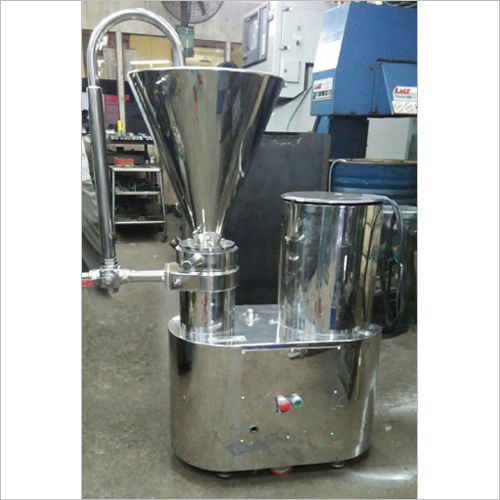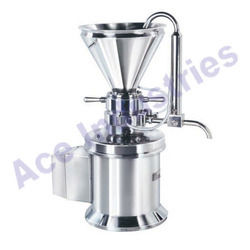Colloidal Mill
Price 150000 INR/ Piece
Colloidal Mill Specification
- Type
- Other
- Material
- SS 316, SS 304, Hastelloy
- Computerized
- No
- Control Mode
- Manual
- Voltage
- 220-240 Volt (v)
- Color
- SS
- Warranty
- 1 Year
Colloidal Mill Trade Information
- Minimum Order Quantity
- 1 Piece
- Payment Terms
- Cash Against Delivery (CAD), Cash Advance (CA)
- Supply Ability
- 10 Pieces Per Month
- Delivery Time
- 4 Week
- Sample Available
- Yes
- Sample Policy
- If order is confirmed we will reimburse the sample cost
- Certifications
- DQ, IQ
About Colloidal Mill
A colloidal mill, also known as a colloid mill or a colloid grinder, is a machine used in the process of reducing the particle size of solid particles suspended in a liquid. It is widely used in various industries, including food processing, pharmaceuticals, and cosmetics, for the production of colloidal suspensions or emulsions.
Here s how a colloidal mill typically works:
1. Components: A colloidal mill consists of a rotor and a stator. The rotor is a high-speed rotating component, while the stator is a stationary component with a conical or cylindrical shape. The gap between the rotor and stator can be adjusted to control the size of the particles produced.
2. Feed Material: The solid particles (often called the "dispersed phase") that need to be reduced in size are added to the liquid (the "continuous phase"). These particles could be anything from nuts and seeds to pharmaceutical compounds or pigments.
3. Shearing Action: When the machine is activated, the rotor spins at high speeds. As the liquid containing the solid particles passes through the gap between the rotor and stator, it undergoes intense shearing, turbulence, and high levels of mechanical stress. This shearing action breaks down the solid particles into smaller sizes, reducing them to colloidal dimensions (typically in the range of micrometers).
4. Emulsion Formation: In addition to reducing the particle size, the colloidal mill can also be used to create stable emulsions. If the solid particles are immiscible in the liquid (such as oil and water), the high shear forces generated in the mill help disperse and homogenize the two phases, creating a stable emulsion.
5. Adjustability: The gap between the rotor and stator can be adjusted to control the final particle size. Smaller gaps produce finer particles, while larger gaps yield coarser particles.
Colloidal mills are versatile machines and find applications in various industries, such as:
1. Food Industry: They are used for grinding and homogenizing food ingredients like nuts, chocolate, and spices. They are also employed in the production of mayonnaise, salad dressings, and various sauces.
2. Pharmaceutical Industry: Colloidal mills are used to reduce the particle size of pharmaceutical compounds, making them more easily absorbable and effective.
3. Cosmetic Industry: These mills are used to create stable emulsions in cosmetics, such as creams, lotions, and ointments.
4. Chemical Industry: Colloidal mills are used in the manufacture of pigments, paints, and coatings.
FAQ:
Q. What is a colloidal mill?
Ans: A colloidal mill is a machine used to reduce the particle size of solid particles suspended in a liquid. It operates by subjecting the mixture to intense shearing forces between a rotating rotor and a stationary stator, resulting in the reduction of particle size and the formation of stable colloidal suspensions or emulsions.
Q. What are the key components of a colloidal mill?
Ans: A colloidal mill typically consists of two main components: a rotor and a stator. The rotor is a high-speed rotating component, while the stator is stationary. The gap between the rotor and stator can be adjusted to control particle size.
Q. What is the purpose of a colloidal mill?
Ans: The primary purpose of a colloidal mill is to reduce the particle size of solid materials suspended in a liquid. It is used for particle size reduction, homogenization, and the creation of stable emulsions.
Q. In which industries are colloidal mills commonly used?
Ans: Colloidal mills are widely used in several industries, including food processing (for making sauces, dressings, and nut pastes), pharmaceuticals (for particle size reduction of drugs), cosmetics (for emulsion formation in creams and lotions), and the chemical industry (for pigment and paint production).
Q. How does a colloidal mill produce emulsions?
Ans: A colloidal mill can create stable emulsions by subjecting immiscible liquids, such as oil and water, to high shear forces. The mill disperses the immiscible liquids into fine droplets and prevents their separation, resulting in a stable emulsion.
Q. What is the typical particle size range achieved with a colloidal mill?
Ans: Colloidal mills are capable of reducing particle sizes to the micrometer range. The exact particle size achieved depends on factors like the gap setting between the rotor and stator and the nature of the materials being processed.
Q. Are colloidal mills easy to clean and maintain?
Ans: Colloidal mills can be disassembled for cleaning and maintenance. Depending on the design, some parts may be removable for easy cleaning. Regular maintenance and proper cleaning are essential to ensure the machine's performance and longevity.
Q. Can colloidal mills handle abrasive or hard materials?
Ans: Colloidal mills are generally not suitable for processing extremely hard or abrasive materials, as they can cause excessive wear and damage to the rotor and stator components. In such cases, specialized equipment may be required.
Q. What safety precautions should be taken when operating a colloidal mill?
Ans: Operators should follow safety guidelines and wear appropriate protective gear when operating colloidal mills. Additionally, it's essential to ensure the machine is properly grounded and to follow manufacturer-specific safety recommendations.
Q. Are there alternatives to colloidal mills for particle size reduction and emulsification?
Ans: Yes, alternatives include high-pressure homogenizers, ultrasonic homogenizers, and bead mills. The choice of equipment depends on the specific requirements of the application and the properties of the materials being processed.


Price:
- 50
- 100
- 200
- 250
- 500
- 1000+
More Products in Colloid Mill Machine Category
Colloid Mill Machine
Price 115000.00 INR / Unit
Minimum Order Quantity : 1 Unit
Computerized : No
Voltage : 220240 Volt (v)
Control Mode : Manual
Warranty : 1 Year
GST : 27AAICA7458F1ZG
 |
Ace Industries (India) Private Limited
All Rights Reserved.(Terms of Use) Developed and Managed by Infocom Network Private Limited. |

 English
English Spanish
Spanish French
French German
German Italian
Italian Chinese (Simplified)
Chinese (Simplified) Japanese
Japanese Korean
Korean Arabic
Arabic Portuguese
Portuguese

 Send Inquiry
Send Inquiry



